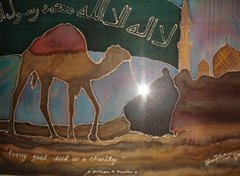
pOS-3
THE DEATH EXPERIENCE
Surah 3 Al-Imran (The Family of Imran)
185. Everyone shall taste death. And only on the Day of Resurrection shall you be paid your wages in full. And whoever is removed away from the Fire and admitted to Paradise, he indeed is successful. The life of this world is only the enjoyment of deception (a deceiving thing).
HARDSHIPS AND AGONIES
Surah 50 Al-Qaf
19. And the stupor of death will come in truth: "This is what you have been avoiding!"
In a Hadith:
Aishah (ra) related: (On the occasion of his approaching death), Allah’s Messenger (saw) had a small vessel of water placed before him. He began to dip his hands in the water, and wiping his face with them. He said: ‘There is none worthy of worship except Allah. Indeed death brings with it agonies!’ Then he raised his hand up and kept repeating, ‘In the most exalted company’ until his soul was taken away and his hand fell limp. (Bukhari)
From what has preceded, it is clear that death causes agony and hardship.
Even the Prophet (saw) prayed to Allah (swt) to help him overcome the great test placed upon him.
“If such great agonies were experienced upon death by the prophets, the messenger and the pious believers…
How can the likes of ourselves be heedless about it – too busy and neglectful in preparing for it?
Two benefits can be derived from the occurrence of such agonies and hardships to the chosen prophets.
The First:
Information given to man of the extent of death’s pain and calamity
Although one may assume that the person died with ease because it appeared that he expired effortlessly. Man can be sure of the agonies faced by the dying person (other than martyrs). Even the Prophets were especially honored by Allah (swt), because they still (experienced and) informed us about the fierce pangs of death.
The Second
In one of Al-Bukhari’s narrations, the Prophet (saw) informed us that the most severely tested are the prophets and then the most righteous
of other men and then those lesser in degree of righteousness. Thus, even though He could have eased their agonies and lightened the pangs of death, Allah (swt) wished to test them in order to complete their virtues and to raise their degrees (in heaven).
However, it is important to understand that Allah (swt) did not intensify their agony to a point greater than that inflicted upon sinful, disobedient people. Therefore, there is no comparison between the two.
APPEARANCE OF SATAN
There is no doubt that Satan comes even to a dying believer. He is ever present, tempting and troubling one during life, even up to the point when one’s soul exits the body. This continuous harassment is indicated in an authentic hadith:
The Prophet (saw) said:” Verily, Satan comes to all circumstances and affairs of life, even at the time of eating.” (Muslim)
Other scholars mentioned that during those critical moments (of death), the Shaytaan (Satan) comes to a person in the form of certain loved ones such as parents, brothers, sisters and friends, etc and encourages him to die a Jew or Christian or some other principles that go against Islam.
‘Abdullah, the son of Imam Ahmad ibn Hanbal, said: “My father was dying, and I had my hand in a piece of cloth with
which to bind his beard. He was drifting in and out of consciousness, and gesturing with his hand to say ‘No, no.’ He did this several times, and I said to him, ‘O my father, what was that?’ He said, ‘The Shaytaan was standing near me, biting his fingertips (i.e. trying hard) and saying, ‘Come on Ahmad!’ and I was saying ‘No, no,’ – until he died.” (Tadhkirat al-Qurtubi, 34)
Qurtubi said: “I heard our shaykh, Imam Abul-‘Abbaas Ahmad ibn ‘Umar al-Qurtubi, saying, ‘I visited a brother of our shaykh, Abu Ja’afar Ahmad ibn Muhammad al-Qurtubi in Qurtubah (Cordova), when he was dying. It was said to him, “Say Laa ilaha illallah,” and he was saying, “No, no.” When he came to consciousness, we mentioned to him that. He said, “Two devils came to me on my right and on my left. One of them was saying, ‘Die as a Jew, for it is the best of religions,’ and the other was saying, ‘Die as a Christian, for it is the best of religions,’ and I was saying to them. ‘No, no’”… (Tadhkirat al-Qurtubi)
It is clarified that these “narrations” are not based on authentic related prophetic traditions, but rather they are stories of people’s experiences.
Shaykh Ibn Taymiyah mentioned that the Shaytaan is at his most keen to mislead a person at the time of death, because it is such a critical time. In support of this view he quoted the hadith which is narrated in As-Saheeh: “It is man’s final deed (before death) that counts.” And he (saw) said:
“A person may do the deeds of the people of Paradise until there is no more than a cubit between him and it, then the decree overtakes him and he does an action of the people of Hell and thus enters it (Hell). Or a person may do the deeds of the people of Hell until there is no more than a cubit between him and it, then the decree overtakes him and he does an action of the people of Paradise and thus he enters it (Paradise).” Hence it is narrated that “the Shaytaan tries his hardest to tempt the son of Adam at the time of death, and he says to his helpers, ’Try to catch this one, for if he gets away you will never catch him,’” (Majmoo’ al-Tataawa, 4/256)
REPENTANCE BEFORE DEATH
Surely death is one of the most traumatic experiences which man must undergo. The Prophet (saw) ordered his followers to seek refuge in Allah from the fitnah (trial and tribulation) of death in the final supplication of every formal prayer:
When any of you completes the last tashahhud of his prayer, let him seek refuge in Allah from four things, saying, ‘O Allah, verily I seek refuge in you from the punishment of the Hellfire and the torment of the grave; from the fitnah of life and death; and from the evil fitnah of the false messiah. (Muslim, Nasai and others)
Every believer should hasten to repent for what sins and shortcomings have preceded s death may come at any time. Prophets (saw) indicating the last moment up to which repentance is accepted:
“Allah accepts the repentance of the servant so long as his spirit has not arrived at his throat.” (Tirmidhi, al-Haakim, Ibn Hibabaan)
Upon the spirit’s reaching the throat, the dying person glimpses at what is in store for him
(Mercy or disgrace). At this point, neither repentance nor the declaration of his faith is of any benefit.
SIGNS INDICATING A GOOD END
Signs which foretell a good end for the deceased believer and consequently, a blissful existence in the life of the Hereafter are:
1. The Pronouncement of the Shahadah (Muslim and Ibn Hibban)
2. Martyrdom on the Battlefield
Surah 3 Al-Imran (The Family of Imran)
169. Think not of those who are killed in the Way of Allah as dead. Nay, they are alive, with their Lord, and they have provision.170. They rejoice in what Allah has bestowed upon them of His Bounty, rejoicing for the sake of those who have not yet joined them, but are left behind (not yet
martyred) that on them no fear shall come, nor shall they grieve.
171. They rejoice in a Grace and a Bounty from Allah, and that Allah will not waste the reward of the believers.
Al-Miqdaam ibn Ma’di Karb narrated that the Messenger of Allah (saw) said:
“The shaheed (martyr) will have six blessings from Allah: he will be forgiven from the first drop of blood shed; he will be shown his place in Paradise; he will be spared the torment of the grave; he will be protected from the great terror (of the Day of Judgment); A crown of dignity, will be placed on his head, one ruby of which is better than this world and all that is in it; he will be married to seventy two of al-hoor al-‘iyn; and he will be permitted to intercede for seventy of his relatives.” This is narrated by Tirmidhi and Ibn Maajah.
3. Death in the Path of Allah
The Prophet (saw) said:
“Every deceased person’s works are sealed (by his death) except by a warrior at his station who died in the path of Allah; for indeed his deeds are increased until the Day of Judgment, and he is protected from the trial of the grave.” (At-Tirmidhi and Ahmad)
E.g. Hijrah (Migration)
E.g. Jihad
E.g. Hajj (Pilgrimage)
E.g. Fasting
E.g. Salah (Prayers)
e.g. Du’aa (Supplications)E.g. reading the Qur’an











